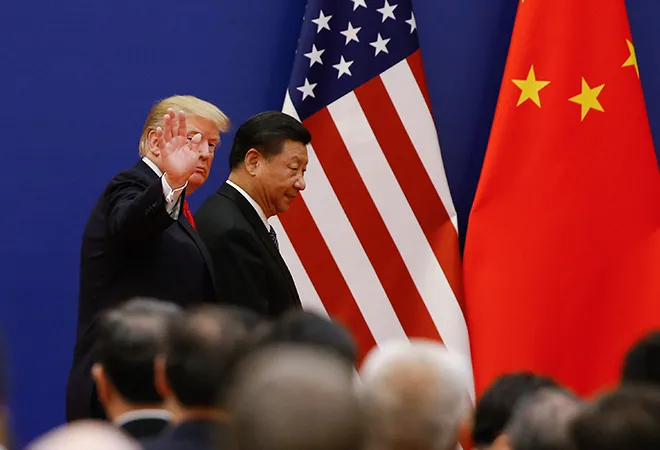-
CENTRES
Progammes & Centres
Location
Continued efforts at looking beyond immediate horizons is required.

Two ongoing geopolitical developments are altering strategic assessments in national capitals the world over. The first is the growing demonstration of international power by the People’s Republic of China. Recent signs of Beijing’s intent include the detention last year of two Canadian citizens in retaliation for Canada’s arrest of a prominent Chinese businesswoman, continued incursions by China’s armed forces of Japanese airspace and exclusive waters, the further militarisation of the South China Sea, revelations of considerable Chinese political influence in Australia and central Europe, and ultimatums to sections of the United States (US) private sector.
The second development involves uncertainty surrounding future US military commitments to Europe, the western Pacific, and the Persian Gulf. These are regions where the US has traditionally exercised military dominance, at least since the end of the Cold War. This uncertainty did not begin under Donald Trump’s presidency, but his election and subsequent positions have exacerbated it. Judging by the rhetoric of some of his possible challengers in the Democratic Party, and the positions of many in the US Congress, open questions about the US’ global military posture could very well extend beyond Trump’s tenure.
The responses among many traditional US allies and partners to these twin trends — a more assertive China and a more uncertain US — have been varied. Some, such as Shinzo Abe’s Japan, Benjamin Netanyahu’s Israel, Boris Johnson’s Britain, and Tsai Ing-Wen’s Taiwan, have sought to recommit to their relationships with Washington, although leadership changes in their countries could alter subsequent calculations. But even these staunch US partners have sought degrees of flexibility, whether the UK on 5G telecommunications, Japan on the Belt and Road Initiative, or Israel on Chinese port investments. Others, such as Australia, have witnessed a more robust debate on the country’s strategic choices in the public sphere, even if little has yet changed of consequence when it comes to the US alliance.
A second approach has essentially involved a policy paralysis — or hope that the associated challenges will dissipate on their own. For example, South Korean business leaders still speak in dire terms about the consequences of a punitive boycott of their companies by China, which followed the introduction of a ballistic missile defence system in 2017. But they generally conclude that it is best to lower tensions with Beijing. Additionally, the deterioration of relations between South Korea and Japan — the US’ closest military ally in Asia — may further contribute to Seoul’s recalibration.
Many of the countries of Southeast Asia are adopting a similar posture. Despite growing criticism at home over his China policy, Philippines President Rodrigo Duterte has continued accommodating Beijing, placing the onus on the US to resist further Chinese encroachment in his country’s waters.
Singapore’s Prime Minister Lee Hsien-Loong’s keynote speech at this year’s Shangri-La Dialogue signaled a more equivocating approach between Washington and Beijing. Even in Vietnam, where China remains very unpopular, the leadership is relying on others to come to their country’s assistance on territorial disputes. The somewhat tired refrain of “don’t ask us to choose” is a common mantra in Southeast Asia, one that overlooks the fact that not making choices is itself a choice.
Perhaps more strikingly, there are those countries who have responded to these new developments by calling for an entirely autonomous approach. Most notable among these is France. President Emmanuel Macron recently gave a candid interview to The Economist, in which he called the North Atlantic Treaty Organization (NATO) — the anchor of US security policy in Europe — “brain dead”. In Macron’s view, it appears, Russia is no longer the challenge to Europe that it once was, and European security resources must be redirected southwards, including towards potential sources of terrorism. At the same time, France’s emerging Indo-Pacific strategy, its scepticism of the Belt and Road Initiative, and its outreach to various regional partners indicate that Macron —perhaps more than most European leaders — appreciates the implications of China’s rise.
We are, therefore, in a world today in which Australian academics openly talk of a Plan B to the US alliance, Southeast Asian leaders speak of not wanting to be forced to make choices, and French leaders expound more and more on strategic autonomy. What had for decades been the vocabulary of Indian strategic elites — resulting in condescension by Southeast Asians, Europeans, and Americans — has apparently become the new normal.
For their part, the emerging poles of Washington and Beijing have themselves struggled to appreciate the consequences of their behaviour. Privately, some Chinese strategic thinkers worry that their leadership has moved too fast, and too soon, in demonstrating national intent. Perhaps more hide and bide was in order. Meanwhile, in Washington, many members of the policy community outside government still struggle to conceive of a world beyond NATO and US hub-and-spoke alliances in Asia.
What does all this mean for New Delhi? Smugness or complacency would be the wrong response. Rather, continued efforts at looking beyond immediate horizons will be required to anticipate further changes to the global strategic landscape.
This commentary originally appeared in Hindustan Times.
The views expressed above belong to the author(s). ORF research and analyses now available on Telegram! Click here to access our curated content — blogs, longforms and interviews.